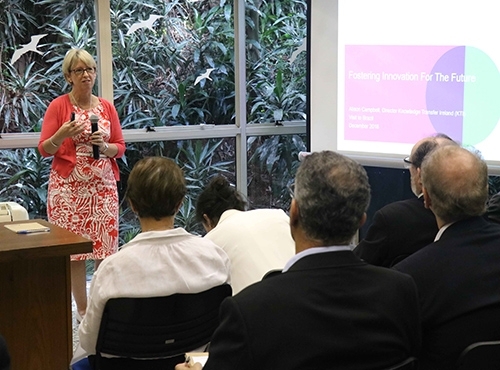


Relationships with business offer strong potential benefits to teaching and returns to society in the form of technology for use on a day-to-day basis, says head of Knowledge Transfer Ireland (photo: Felipe Maeda / Agência FAPESP)
Published on 05/13/2021
By André Julião | Agência FAPESP – Technology transfer offices (TTOs) play an important role as a channel between academia and industry in Europe and the United States, commercializing the research performed in universities by means of patents and new products. Some even earn a profit for research institutions, but this should not be their purpose. Their main aim should be to put students in touch with the problems faced by business organizations and supply society with the innovations for which it has already paid via taxation.
This is the view of Alison Campbell, Director of Knowledge Transfer Ireland, established in 2013 in the Republic of Ireland to enable business to realize the commercial potential of the research and innovations produced by academia. Campbell was a speaker at the FAPESP/Ireland Workshop on Knowledge Transfer held on December 3, 2018, at FAPESP’s headquarters in São Paulo City, Brazil.
According to Campbell, few TTOs earn a return in the form of profit for universities even in the US. “When you see the statistics, you think the US is doing incredible work, licensing lots of products and earning hundreds of millions of dollars in returns to these institutions. But in actual fact only a few are making a profit,” Campbell said.
Links between academia and business also benefit teaching at universities because they put students in touch with real entrepreneurial conditions. “Universities have to believe [this interaction] is indeed very important. I’m really very impressed by how far ahead some of our university institutes are, in terms not just of leadership but of the environment they create,” she said.
For example, Campbell noted, undergraduate students at the University of Limerick in the south of Ireland are given an opportunity to spend time on business premises observing the problems faced on a day-to-day basis.
“This is excellent for students,” she said. “To do this, most colleges need to develop relationships with firms because the students have to be supervised while they’re there. This creates a more vibrant and connected environment, helping firms understand how academics go about doing research and helping students understand the challenges firms have to deal with.”
It is risky to rely on a financial return from a TTO because even if it does sometimes make a profit, this income will not be constant. Counting on such a source of money in plans for future years is a mistake, Campbell stressed, recalling conversations with people at TTOs in different countries who all agree that it is an “illusion” to expect them to be a funding source.
“A colleague who works at a TTO that receives substantial amounts of royalties from patents on medical drugs developed at the university in question has to explain to the university that further down the road, there will be more patents and more royalties, but there will be nothing at all for the next five years owing to the nature of the innovation cycle,” she said.
International collaboration
International collaboration in science has always been one of Ireland’s strong points, Campbell explained, partly because it is a small country. “We want to see more collaboration because it means skills, expertise, new knowledge, and different ways of thinking and creating together,” she said. “It’s incredibly positive and enriching.”
Brazil is one of these partners, and in the days ahead, a new agreement will be signed between the Irish Research Council and FAPESP.
“Our goal is to issue calls for proposals involving large-scale collaborative projects to be conducted by researchers there and here, with each country funding its own contribution. This is a model used by FAPESP to work with several national research funding agencies,” said Marilda Bottesi, FAPESP’s special advisor for research collaboration.
Research projects will be funded in all knowledge areas and will not necessarily have to aim at immediate applications.
“Under the Science without Borders program, we received 3,300 Brazilian students, who conducted university-level research and built research ties between Brazil and Ireland. This contact gave rise to events and partnerships,” Barry Tumelty, Consul General of Ireland in São Paulo, told Agência FAPESP.
“The partnership with FAPESP will open up the possibility of even more collaboration. Ireland ranks eleventh in the world in terms of research quality, and we’re part of the European Union, so we’re a logical partner for Brazilians who want access to Horizon 2020,” said Tumelty about the new phase of EU’s research funding program, which foresees investments in the order of €100 billion in science, technology and innovation between 2021 and 2027.
Source: https://agencia.fapesp.br/29582